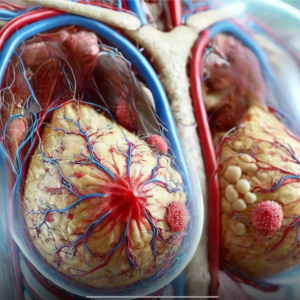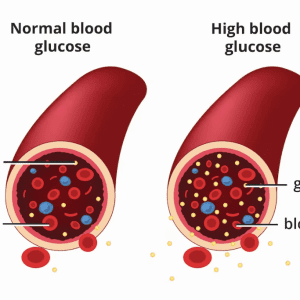Thyroid cancer is often considered a silent adversary, creeping in without making much noise. Unlike some other forms of cancer, it typically doesn’t cause noticeable symptoms in its early stages, making it easy to overlook. However, understanding the warning signs can make a significant difference in early diagnosis and treatment. Here are the five early signs of thyroid cancer that you should never ignore.
1. Unusual Lumps or Swelling in the Neck

One of the first signs of thyroid cancer is a noticeable lump or swelling in the neck. This is often mistaken for a benign condition or dismissed as a minor issue. However, a thyroid nodule differs from ordinary swelling caused by infections.
Here’s how to distinguish it:
- Firm and Well-Defined: The lump feels solid and well-outlined rather than soft and diffuse.
- Moves When Swallowing: You might notice that the lump moves slightly up and down when you swallow.
- Painless at First: In the early stages, it generally doesn’t hurt.
- Swollen Lymph Nodes: In some cases, nearby lymph nodes may also swell as the cancer spreads.
Video: 10 Warning Signs of Thyroid Cancer
If you notice a persistent or growing lump in your neck, it’s essential to see a healthcare professional. They may recommend an ultrasound or a biopsy to evaluate the nodule.
2. Persistent Hoarseness or Voice Changes

Another early sign that often goes unnoticed is a change in your voice. Thyroid cancer can affect the nerves that control your vocal cords, leading to:
- Ongoing Hoarseness: If your voice remains hoarse for more than a few weeks without any clear reason, it’s worth investigating.
- Difficulty Speaking Clearly: You may find that your words sound weak or breathy.
- Throat Discomfort While Talking: Speaking might become slightly painful or uncomfortable.
Since many factors can cause voice changes, it’s crucial not to panic. However, if the issue lingers or worsens, a thorough medical evaluation is necessary.
3. Chronic Cough Without Cold or Flu Symptoms

A cough that persists without being linked to a cold, flu, or other respiratory illness can be a subtle but crucial sign of thyroid cancer. Here’s how to differentiate it:
- No Mucus Production: Unlike a typical cough from a cold, it’s usually dry.
- No Fever or Congestion: It occurs independently of other cold symptoms.
- Persistent and Unexplained: It lingers for weeks or even months without improvement.
If you experience a stubborn cough that just won’t go away, it’s time to consult a healthcare provider. Chronic coughing can sometimes indicate that a thyroid tumor is pressing against the trachea.
4. Shortness of Breath and Difficulty Breathing

As thyroid tumors grow, they may begin to press against the trachea, causing breathing difficulties. Here’s what you might experience:
- Breathlessness Without Exertion: You may feel short of breath even when resting.
- Difficulty Taking Deep Breaths: Breathing may feel restricted or tight.
- A Sensation of Throat Tightness: As if something is pressing inward.
These symptoms can easily be mistaken for other respiratory issues, but if they persist, they warrant medical attention. An ultrasound or imaging study can determine if a thyroid mass is the culprit.
5. Pain or Discomfort in the Neck

While neck pain can result from various causes, persistent pain that doesn’t subside should raise concern. In the case of thyroid cancer, the discomfort may present as:
- A Persistent Ache in the Front of the Neck: This can feel like a dull, constant pain.
- Pain Radiating to the Jaw or Ears: The discomfort may not be localized and can spread to surrounding areas.
- Increased Sensitivity When Swallowing: Even small movements of the neck might feel uncomfortable.
Neck pain that escalates over time, especially if accompanied by other symptoms, should prompt a medical check-up.
Video: Thyroid Cancer Symptoms & Early Warning Signs
Symptoms of Advanced Thyroid Cancer

If thyroid cancer progresses beyond the early stages, symptoms may become more severe and harder to ignore:
- Fixed, Enlarged Tumor: The lump becomes more rigid and does not move when swallowing.
- Difficulty Swallowing: The tumor may press on the esophagus, making swallowing painful.
- Severe Hoarseness: The voice may become permanently altered as the tumor impacts vocal cords.
- Enlarged Lymph Nodes: Persistent swelling in the neck can indicate cancer spread.
Early detection can make a significant difference in outcomes, so recognizing these signs is vital.
When to See a Doctor

If you notice any of the above symptoms persisting for more than a few weeks, it’s crucial to seek medical advice. Early diagnostic methods include:
- Physical Examination: To check for lumps or irregularities.
- Ultrasound Imaging: To detect nodules and evaluate their size.
- Biopsy Tests: To examine thyroid tissue for cancerous cells.
- Blood Tests: To assess thyroid hormone levels for abnormalities.
Early detection allows for less aggressive treatment and significantly improves survival rates.
Final Thoughts: Stay Proactive About Your Health
Thyroid cancer often sneaks in without fanfare, but recognizing the signs early can be a lifesaver. Unusual lumps, persistent voice changes, a chronic cough, breathing difficulties, and neck pain should never be overlooked.
Regular check-ups, self-examinations, and a keen awareness of your body can help you detect potential issues before they escalate. If something doesn’t feel right, don’t hesitate to seek professional medical advice. Early action saves lives, and being proactive about your health ensures you’re always one step ahead.
Your health is your most valuable asset—take charge and stay informed!


